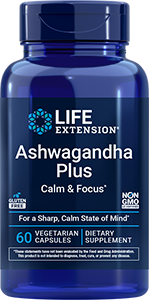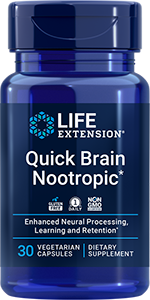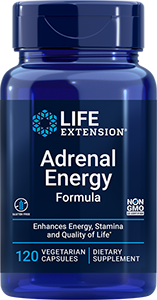
Adaptogens and Nootropics: What's the Difference?
Published: February 2024
In an era of never-ending meetings and constant challenges, stress and a lack of concentration are at an all-time high. Whether it's from work, relationships, school, or just the day-to-day tasks of living, this can all take a toll on the body and its ability to function. It's safe to say that stress relief and mental clarity (aka staying "zen") are priorities at the top of people's minds.
While techniques like exercise, mindfulness, or just getting enough sleep can help manage some of these stresses and support your overall brain health, people are increasingly seeking out different options for managing the demands of everyday life—including supplementing with adaptogens and nootropics.
Maybe you've heard about adaptogenic herbs and nootropic supplements from a friend who recently started taking them, or maybe you've been researching ways to stay focused and alert.
But adaptogens and nootropics are more than just "study partners"—they offer a host of health benefits, including stress-protective properties, support for different types of cognitive function, promoting healthy blood flow, and ensuring the body is balanced. But with all these benefits, it's hard to know when to take which. In this piece, we're going to dive into all the things you need to know about adaptogens and nootropics.
What are adaptogens?
While there is no one standard definition, adaptogens are generally known as herbs, mushrooms, and plant-based extracts that can help the body better manage stress while supporting a healthy, more balanced state in the body.
Many different factors play into how much stress a person is feeling on a given day. Any kind of stressor—including physical, emotional, and even hormonal—can impact your healthy levels of cortisol. This can inevitably impact several other processes in the body. And sometimes, no matter how hard we try, it can feel impossible to self-regulate our stress, which is where supplements can offer tremendous value.
One way adaptogens achieve their stress-modulating properties is through their ability to promote already-healthy levels of cortisol, a well-known stress hormone. Experts also believe that adaptogens interact with the hypothalamic-pituitary-adrenal (HPA) axis, which initiates your body's stress response and plays a big role in keeping your body in balance.
This means that when those challenges inevitably arise, your feelings won't overwhelm you. Adaptogens may even help support adaptability and resilience—meaning they can help the body learn how to better respond to those moments of stress or frustration. In a clinical trial comprised of 130 adults taking either ashwagandha extract once or twice daily or placebo, after 60 days, all stress-related parameters were significantly improved in the groups receiving ashwagandha.
Pro tip: It's worth making a distinction between different kinds of stressors. There are bad stressors—like a breakup or an upcoming test—and there are good stressors, like exercise. Adaptogens act as "eustressors," the kind of good stressors that are beneficial to the body.
Some common adaptogens you've heard of include ashwagandha, specific mushrooms (like lion's mane and reishi), ginseng, bacopa monnieri, rhodiola rosea, holy basil, and even more we'll cover later.
What are nootropics?
Nootropics are defined as substances that help promote cognitive function, such as memory and learning. Given how many hats we're expected to wear, it's no surprise that we sometimes need a pick-me-up. Among the health-conscious, it's becoming more common to reach for nootropics to boost mental performance.
Some nootropics, like spearmint extract and sage extract, promote cognition (including quick recall and focus) and memory health.
Generally speaking, these brain-boosting ingredients can be used by healthy individuals to enhance memory, focus, energy levels, healthy neurotransmitter function and overall concentration.
What is the difference between adaptogens and nootropics?
Although the terms adaptogens and nootropics are often grouped together, they serve two different roles.
Adaptogens help manage stress, and nootropics boost brain health and performance, ensuring your noggin is firing on all cylinders. However, since cognitive health and stress management go hand in hand, adaptogens and nootropics can often be paired together.
Case in point: ashwagandha, considered a powerful adaptogen and known for its ability to support a healthy stress response, is often paired with spearmint, a well-known nootropic that is clinically studied to promote a boost in cognitive function. Put them together and you have a dream team for promoting calm and focus—talk about the best of both worlds!
Where can I find adaptogens?
Like we mentioned, some common adaptogens include ashwagandha, ginkgo biloba, sage, mushrooms (including reishi and lion's mane mushrooms) and bacopa monnieri. Many of these are native to Asian countries and thus have a rich history in Eastern health regimens, which have become steadily more popular in the West throughout the 21st century.
Sometimes adaptogenic herbs, like the ones mentioned above, are taken in teas or added to foods in powder form, but they are most commonly taken as dietary supplements, providing clinically studied extract forms of these herbs. Even though some appreciate the bitter and earthy taste that ashwagandha adds to their tea, others may prefer a capsule form of these adaptogenic options for their convenience.
Where can I find nootropics?
You'd be surprised at the number of products in your day-to-day life that can be considered nootropics, such as caffeine or L-theanine. Some people even consider blueberries to be nootropics! It's important to be discerning, though—not all nootropics are made alike.
Some occur in foods, including Panax ginseng, ginkgo biloba, and gotu kola (Centella asiatica). Alpha-GPC and CDP-choline are two popular and very effective nootropics. And as a bonus, all of the nootropics we listed are available as supplements! The good thing about a quality nootropic supplement is that it will contain a standardized dosage and is less time-consuming than teas and foods.
Some nootropics need to be used long-term and don't take immediate effect after a single dose. So, while a nootropic may not instantly improve cognitive performance, making it a habit to consistently have some can be a powerful step towards boosting your cognitive function, especially when used in conjunction with other adaptogens.
When should I take adaptogens or nootropics?
Adaptogens and nootropics are designed to work with the body to help manage and relieve stress. However, they aren't a magic bullet and they aren't intended to replace a healthy lifestyle.
You'll get the most bang for your buck if you make sure you're putting your wellness first, which includes maintaining a sensible weight, prioritizing proper nutrition and exercise, and of course getting enough sleep. If you feel like managing work and relationships is getting to be too much, it's always worth addressing the root causes of your stress by making any necessary changes.
Regardless of what you choose to do, be sure you take precautions. Carefully read product labels, follow the instructions, increase dosages slowly, and discuss taking more than one supplement at a time for a specific need with your doctor.
Remember, life constantly throws curveballs, but adaptogens and nootropics can help you weather these storms and achieve clarity, resilience and mental balance. Hopefully, trying these supplements will offer you a path to help manage your stress, support optimal brain function, and lead to a happier, healthier life.
References
- Auddy B, et al. "A Standardized Withania Somnifera Extract Significantly Reduces Stress-Related Parameters in Chronically Stressed Humans: A Double-Blind, Randomized, Placebo-Controlled Study." November 2008. https://www.researchgate.net/publication/242151370_A_Standardized_Withania_Somnifera_Extract_Significantly_Reduces_Stress-Related_Parameters_in_Chronically_Stressed_Humans_A_Double-Blind_Randomized_Placebo-Controlled_Study
- Hunnes D. "What are adaptogens and the possible benefits of taking them?" UCLA Fielding School of Public Health. February 2022. https://ph.ucla.edu/news-events/news/what-are-adaptogens-and-possible-benefits-taking-them
- Liao LY, et al. "A preliminary review of studies on adaptogens: comparison of their bioactivity in TCM with that of ginseng-like herbs used worldwide." Chin Med. November 2018. https://www.ncbi.nlm.nih.gov/pmc/articles/PMC6240259/
- Mohammad A, et al. "Adaptogenic herbs: A natural way to improve athletic performance." Elsevier Health Sciences Review. June 2023. https://sciencedirect.com/science/article/pii/S2772632023000181
- Malik M, Tlustos P. "Nootropics as Cognitive Enhancers: Types, Dosage and Side Effects of Smart Drugs." Nutrients. August 2022. https://www.ncbi.nlm.nih.gov/pmc/articles/PMC9415189/
- Panossian A, et al. "Evolution of the adaptogenic concept from traditional use to medical systems: Pharmacology of stress‐ and aging‐related diseases." Med Res Rev. January 2021. https://www.ncbi.nlm.nih.gov/pmc/articles/PMC7756641/
- Panossian A. "Understanding adaptogenic activity: specificity of the pharmacological action of adaptogens and other phytochemicals." Annals of the New York Academy of Sciences. June 2017. https://nyaspubs.onlinelibrary.wiley.com/doi/full/10.1111/nyas.13399
- Tóth-Mészáros A, et al. "The effect of adaptogenic plants on stress: A systematic review and meta-analysis." Journal of Functional Foods. September 2023. https://www.sciencedirect.com/science/article/pii/S1756464623002955
- "Adaptogens". VA Office of Patient Centered Care and Cultural Transformation. https://www.va.gov/WHOLEHEALTHLIBRARY/docs/Adaptogens.pdf
- "Nootropic." ScienceDirect. https://www.sciencedirect.com/topics/neuroscience/nootropic
- "What are adaptogens and should you be taking them?" UCLA Health. February 2022. https://www.uclahealth.org/news/what-are-adaptogens-and-should-you-be-taking-them










